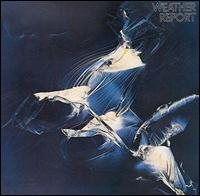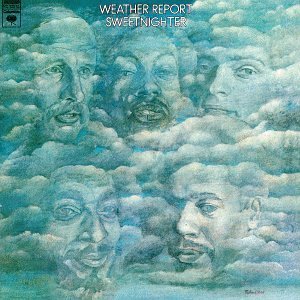
Sweetnighter is the third studio album by American jazz fusion band Weather Report, released by Columbia Records in 1973.

Miroslav Ladislav Vitouš is a Czech jazz bassist.

8:30 is the second live album from the jazz fusion group Weather Report, issued in 1979 by ARC/Columbia Records. The album rose to No. 3 on the Billboard Jazz Albums chart and No. 47 on the Billboard 200 chart. 8:30 also won a Grammy Award for Best Jazz Fusion Performance.
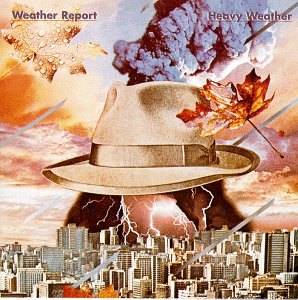
Heavy Weather is the seventh album by Weather Report, released in 1977 through Columbia Records. The release sold about 500,000 copies; it would prove to be the band's most commercially successful album and one of the best sellers in the Columbia jazz catalog. DownBeat magazine gave Heavy Weather a 5-star review, and later its readers voted it jazz album of the year.

The Inner Mounting Flame is the debut studio album by American jazz-rock fusion band Mahavishnu Orchestra, recorded in August 1971 and released later that year by Columbia Records. After their formation, the group performed several debut gigs before they entered the studio to record their first album featuring all original material written by guitarist John McLaughlin.

In a Silent Way is a studio album by the American jazz trumpeter, composer, and bandleader Miles Davis, released on July 30, 1969, on Columbia Records. Produced by Teo Macero, the album was recorded in one session date on February 18, 1969, at CBS 30th Street Studio in New York City. Macero edited and arranged Davis's recordings from the session to produce the album. Marking the beginning of his "electric" period, In a Silent Way has been regarded by music writers as Davis's first fusion recording, following a stylistic shift toward the genre in his previous records and live performances.

Black Market is the sixth studio album by American jazz fusion band Weather Report. Released in 1976, it was produced by Joe Zawinul and Wayne Shorter. It was recorded between December 1975 and January 1976 and released in March 1976 through Columbia Records. Columbia released it again as a digitally remastered CD in 1991.

Romantic Warrior is a studio album by the American jazz fusion band Return to Forever, their first recorded for Columbia Records, after releasing their previous four albums on Polydor. In February 1976, the group retreated to Caribou Ranch near Nederland, Colorado to record. It was the first album to remove the "featuring Chick Corea" credit from beside the band name on the album cover. Despite the music being more dense and avant-garde than the funkier No Mystery, it remains the band's highest selling album with over 500,000 copies sold in the US alone.

I Sing the Body Electric is the second studio album released by the American jazz fusion band Weather Report in 1972.

Mysterious Traveller is the fourth studio album by the jazz and jazz fusion ensemble Weather Report and was released in 1974. This was their final recording with founding bassist Miroslav Vitouš, who left due to creative differences. Vitouš was replaced by Alphonso Johnson. Another addition to the line-up is drummer Ishmael Wilburn. Greg Errico was the drummer for the tour between the previously released Sweetnighter and this album, but declined an invitation to be a permanent member of the band.

Tale Spinnin' is the fifth studio album by Weather Report, recorded and released in 1975, featuring the addition of drummer Leon "Ndugu" Chancler, who was recruited after Josef Zawinul heard him play with Carlos Santana. Weather Report was recording in the studio next door to Ndugu, and asked him to join them for “one session”. That session ended up lasting a week and produced Tale Spinnin'. Ndugu was asked to join as a permanent member, but decided to stay with Santana.
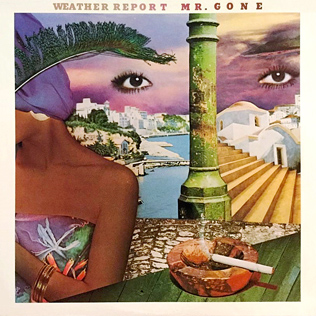
Mr. Gone is the eighth studio album by jazz fusion band Weather Report released in 1978 by ARC/Columbia Records. The album reached number one on the Billboard Jazz Albums chart.

Weather Report is the tenth studio album by the American jazz fusion band Weather Report, released in January 1982. The band's first album is also self-titled, causing confusion among consumers and retailers upon its release. It is the final album featuring bass guitarist Jaco Pastorius and drummer Peter Erskine in the rhythm section.
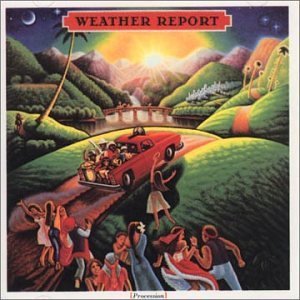
Procession is the eleventh studio album by the jazz fusion band Weather Report. It was released in 1983 through Columbia Records. Although several previous Weather Report tracks included wordless singing, and "And Then" from Mr. Gone included brief lyrics, "Where the Moon Goes" was the band's first track including lyrics throughout, sung by members of The Manhattan Transfer. The band would continue to feature vocals on the next three studio albums.

Sportin' Life is the thirteenth studio album by American jazz fusion band Weather Report which was released in June 1985 through Columbia Records. Although featuring many more vocal performances than any of their previous studio albums, words are rare and most vocals are chants from guest musicians such as Bobby McFerrin or Carl Anderson. The album is named after a character from Porgy and Bess. Sportin' Life was to be the last Weather Report studio album, but due to contractual obligations with Columbia the band had to release a follow-up, This Is This!, in 1986.

Live in Tokyo is the third release, and first live album by Weather Report. Originally released by CBS/Sony in Japan only, it was not released in the US until a 2014 CD reissue by Wounded Bird Records. Recording took place on January 13, 1972, one of five sold-out concerts played in Japan during that January. I Sing the Body Electric (1972) contained several tracks that were edited for the studio album, but can be heard as they were performed, in their entirety, on this live album.

Native Dancer an album by Wayne Shorter featuring Milton Nascimento, and features some of his most acclaimed compositions. It is notable for blending jazz, rock and funk elements with Brazilian rhythms in an attempt to create "world" music broadly accessible to people from many different cultures. Many American musicians have mentioned being influenced by the album, including bassist Esperanza Spalding, drummer Chester Thompson and vocalist Maurice White of Earth, Wind, and Fire.

Water Babies is a compilation album by American jazz trumpeter Miles Davis. It compiled music Davis recorded in studio sessions with his quintet in 1967 and 1968, including outtakes from his 1968 album Nefertiti and recordings that foreshadowed his direction on In a Silent Way (1969), while covering styles such as jazz fusion and post-bop. Water Babies was released by Columbia Records in 1976 after Davis had (temporarily) retired.

Zawinul is the third studio album by jazz composer and pianist Joe Zawinul recorded in 1970 by Zawinul performing music arranged for two electric pianos, flute, trumpet, soprano saxophone, two contrabasses, and percussion. The album reached number 17 in the Billboard Jazz album charts.

75 is a live album by Austrian-American jazz musician Joe Zawinul and his band the Zawinul Syndicate. It was recorded in 2007 at two performances in Switzerland and Hungary, among bandleader Joe Zawinul's final performances. The album was produced by Joachim Becker and originally released in 2008 by JVC Compact Discs, with the Zawinul Estate and Becker serving as executive producers. It was later released by BHM Productions and Heads Up International, the BHM release with the alternate title 75th. It peaked at number eighteen on Billboard's Top Jazz Albums chart and won the 2010 Grammy Award for Best Contemporary Jazz Album. The album received a generally positive critical reception.
